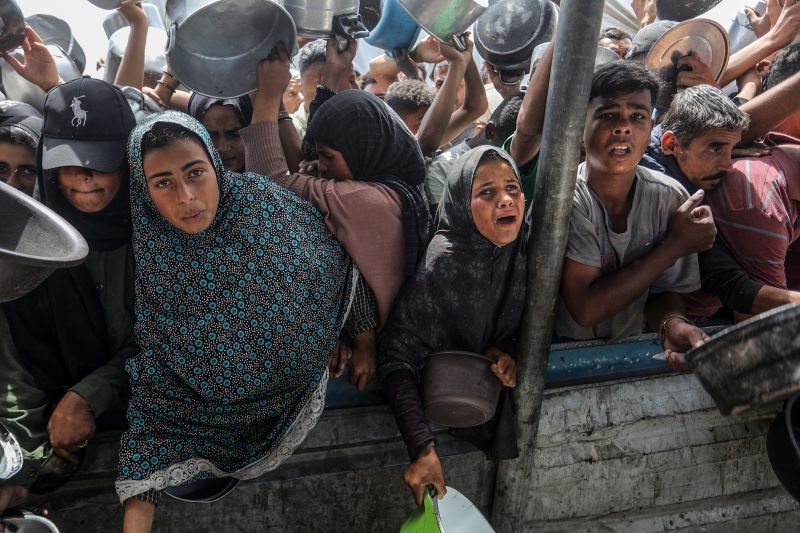
One in five people in Gaza face starvation, report warns, as Israel’s months-long blockade continues
One in five people in the Gaza Strip are facing starvation as the entire territory edges closer to famine, a new United Nations-backed report warns, after nearly three months of Israel’s blockade of critically needed humanitarian aid.
The warning comes as the UN and several NGOs, as well as civilians in Gaza, say the situation has deteriorated since Israel launched its renewed assault on the enclave in March, as residents struggle to access food, medicine and clean water.
The enclave’s entire population is experiencing “high levels of acute food security” and the territory is at “high risk” of famine, the most severe type of hunger crisis, the Integrated Food Security Phase Classification (IPC) said in its latest report Monday.
“Goods indispensable for people’s survival are either depleted or expected to run out in the coming weeks,” the IPC said. Food is running out, and what little is left is being sold at exorbitant prices that few can afford, it said.
Israel imposed a humanitarian blockade on Gaza on March 2, cutting off food, medical supplies, and other aid to the more than 2 million Palestinians who live in the territory. Israel says the blockade, along with the military’s expansion of its bombardment of Gaza, is intended to pressure Hamas to release hostages held in the enclave – but international organizations say it violates international law, with some accusing Israel of using starvation as a weapon of war.
There is a “high risk” that famine will occur between now and the end of September, the IPC report warned, leaving most people in Gaza without access to food, water, shelter, and medicine.
“Only an immediate and sustained cessation of hostilities and the resumption of humanitarian aid delivery can prevent a descent into famine,” the report said.
Under the IPC system – a five-phase scale used to measure the severity of food insecurity – a famine can only be declared if data shows certain thresholds are met. Those conditions are: at least 20% of all households must face an extreme food shortage, 30% or more of children must be acutely malnourished, and at least 2 in every 10,000 people die every day because of outright starvation or the interaction of malnutrition and disease.
The first threshold has already been met, according to the IPC. Nearly 469,500 people – around 22% of the population – will likely experience “catastrophic” food insecurity, the highest phase on the IPC scale, between May and September, the report said.
David Mencer, a spokesperson for Israeli Prime Minister Benjamin Netanyahu’s office, said Monday that “famine has never happened” in Gaza, despite IPC warnings, and that if there is hunger in Gaza, it is caused by Hamas depriving civilians of humanitarian aid.
Since March, Israel’s renewed assault has displaced more than 430,000 people, the report said, disrupting essential services and the distribution of critical supplies.
All 25 bakeries run by the UN’s World Food Programme (WFP) were forced to shutter at the beginning of April due to lack of supplies, and food is running out at most of the 177 hot meal kitchens, according to the IPC report. And food prices are soaring.
Prices for flour have increased 3,000% since February and 55-pound sack of wheat flour can run anywhere between $235 and $520, the report said.
Pregnant women and children among the most at risk
Children and pregnant women are at particularly high risk. Nearly 71,000 cases of acute malnutrition among children under five are expected between April 2025 and March 2026, the report said. And nearly 17,000 pregnant and breastfeeding women will need treatment for acute malnutrition, it said.
“My kids are vomiting after they eat it. It smells horrible,” Rajab said. “But what else can I do? What will I feed my children if not this?”
Dr. Amjad Al-Muzaini, a gynecologist working in Gaza City, said women in Gaza are forced to choose between feeding their children or caring for their own health. Most often, they sacrifice their own well-being to ensure survival, he said.
While doing cesarean surgeries, women were found to have severely deteriorated intestinal and uterine tissues, Al-Muzaini said, likely the effects of eating poor-quality and mainly canned foods.
The WFP has said recently it is ready to surge enough aid into Gaza to feed the entire population for up to two months. UNRWA, the main UN agency supporting Palestinians, said it has nearly 3,000 trucks filled with aid waiting to cross into Gaza that is currently blocked by Israel.
“Families in Gaza are starving while the food they need is sitting at the border,” the WFP’s Executive Director, Cindy McCain said on X. “But WFP hasn’t been able to get new aid in since 2 March.”
“If we wait for famine to be officially confirmed, it will be TOO LATE,” she said.
Israel launched its war in Gaza following Hamas’ October 2023 attack in which militants killed 1,200 people and took 251 hostage. Since then, Israel’s military campaign has killed almost 53,000 Palestinians. Since Israel resumed its bombardment in March, more than 2,500 Palestinians have been killed, according to figures provided by the Ministry of Health in Gaza.
